TUTOR1 STUDYHUB
BEST RELIABLE AND TRUSTWORTHY STUDYMATERIALS
- 855
- 0
- 0
Community
- Followers
- Following
1 Reviews received
855 items
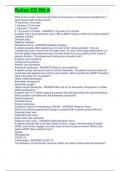
Relias ED RN A
Relias ED RN A What is the current recommended dose of intravenous or intraosseous epinephrine in adult patients with cardiac arrest? 10 mg every 10 minutes 1 mg every 3-5 minutes 1 mg every 7 minutes 0.1 mg every 2 minutes - ANSWER-1 mg every 3-5 minutes A patient with a traumatic brain injury (TBI) is MOST likely to suffer from what condition? Diabetes mellitus Cerebral palsy Diabetes Insipidus Myxedema coma - ANSWER-Diabetes Insipidus A patient presents after sustaining a roll-over motor veh...
- Exam (elaborations)
- • 11 pages •
Relias ED RN A What is the current recommended dose of intravenous or intraosseous epinephrine in adult patients with cardiac arrest? 10 mg every 10 minutes 1 mg every 3-5 minutes 1 mg every 7 minutes 0.1 mg every 2 minutes - ANSWER-1 mg every 3-5 minutes A patient with a traumatic brain injury (TBI) is MOST likely to suffer from what condition? Diabetes mellitus Cerebral palsy Diabetes Insipidus Myxedema coma - ANSWER-Diabetes Insipidus A patient presents after sustaining a roll-over motor veh...
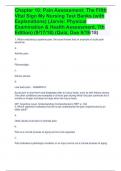
Chapter 10: Pain Assessment
Chapter 10: Pain Assessment: The Fifth Vital Sign My Nursing Test Banks (with Explanations) (Jarvis: Physical Examination & Health Assessment, 7th Edition) (9/17/18) (Quiz, Due 9/18/18) 1. When evaluating a patients pain, the nurse knows that an example of acute pain would be: a. Arthritic pain. b. Fibromyalgia. c. Kidney stones. d. Low back pain. - ANSWER-C Acute pain is short-term and dissipates after an injury heals, such as with kidney stones. The other conditions are examples ...
- Exam (elaborations)
- • 12 pages •
Chapter 10: Pain Assessment: The Fifth Vital Sign My Nursing Test Banks (with Explanations) (Jarvis: Physical Examination & Health Assessment, 7th Edition) (9/17/18) (Quiz, Due 9/18/18) 1. When evaluating a patients pain, the nurse knows that an example of acute pain would be: a. Arthritic pain. b. Fibromyalgia. c. Kidney stones. d. Low back pain. - ANSWER-C Acute pain is short-term and dissipates after an injury heals, such as with kidney stones. The other conditions are examples ...
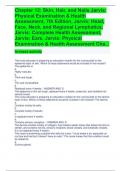
Chapter 12: Skin, Hair, and Nails Jarvis: Physical Examination & Health Assessment, 7th Edition.
Chapter 12: Skin, Hair, and Nails Jarvis: Physical Examination & Health Assessment, 7th Edition, Jarvis: Head, Face, Neck, and Regional Lymphatics, Jarvis: Complete Health Assessment, Jarvis: Ears, Jarvis: Physical Examination & Health Assessment Cha... In-class activity The nurse educator is preparing an education module for the nursing staff on the epidermal layer of skin. Which of these statements would be included in the module? The epidermis is: a. Highly vascular. b. Thick an...
- Exam (elaborations)
- • 146 pages •
Chapter 12: Skin, Hair, and Nails Jarvis: Physical Examination & Health Assessment, 7th Edition, Jarvis: Head, Face, Neck, and Regional Lymphatics, Jarvis: Complete Health Assessment, Jarvis: Ears, Jarvis: Physical Examination & Health Assessment Cha... In-class activity The nurse educator is preparing an education module for the nursing staff on the epidermal layer of skin. Which of these statements would be included in the module? The epidermis is: a. Highly vascular. b. Thick an...
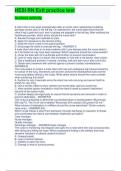
HESI RN Exit practice test
HESI RN Exit practice test In-class activity A client who is one week postoperative after an aortic valve replacement suddenly develops severe pain in the left leg. On assessment, the nurse determines that the client's leg is pale and cool, and no pulses are palpable in the left leg. After notifying the healthcare provider, which action should the nurse take? A. Elevate the legs and medicate for pain. B. Apply firm pressure to the femoral artery. C. Keep the client in bed in the supine positi...
- Exam (elaborations)
- • 6 pages •
HESI RN Exit practice test In-class activity A client who is one week postoperative after an aortic valve replacement suddenly develops severe pain in the left leg. On assessment, the nurse determines that the client's leg is pale and cool, and no pulses are palpable in the left leg. After notifying the healthcare provider, which action should the nurse take? A. Elevate the legs and medicate for pain. B. Apply firm pressure to the femoral artery. C. Keep the client in bed in the supine positi...
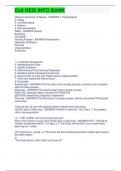
Exit HESI INFO BANK
Exit HESI INFO BANK Maslow's Hierarchy of Needs - ANSWER-1. Physiological 2. Safety 3. Love/Belonging 4. Esteem 5. Self-actualization ABCs - ANSWER-Airway Breathing Circulation Nursing Process - ANSWER-Assessment Diagnosis (Analysis) Planning Implementation Evaluation *1. Complete Assessment 2. Assess/Analyze Data 3. Identify Problems 4. Determining Priority Nursing Diagnoses 5. Establish Goals & Expected Outcomes 6. Discuss Plan of Care with Patient before Implementation 7. Plans and Impleme...
- Exam (elaborations)
- • 8 pages •
Exit HESI INFO BANK Maslow's Hierarchy of Needs - ANSWER-1. Physiological 2. Safety 3. Love/Belonging 4. Esteem 5. Self-actualization ABCs - ANSWER-Airway Breathing Circulation Nursing Process - ANSWER-Assessment Diagnosis (Analysis) Planning Implementation Evaluation *1. Complete Assessment 2. Assess/Analyze Data 3. Identify Problems 4. Determining Priority Nursing Diagnoses 5. Establish Goals & Expected Outcomes 6. Discuss Plan of Care with Patient before Implementation 7. Plans and Impleme...
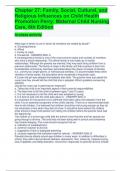
Chapter 27
Chapter 27: Family, Social, Cultural, and Religious Influences on Child Health Promotion Perry: Maternal Child Nursing Care, 6th Edition In-class activity What type of family is one in which all members are related by blood? a. Consanguineous b. Affinal c. Family of origin d. Household - ANSWER-ANS: A A consanguineous family is one of the most common types and consists of members who have a blood relationship. The affinal family is one made up of marital relationships. Although the parents ...
- Exam (elaborations)
- • 4 pages •
Chapter 27: Family, Social, Cultural, and Religious Influences on Child Health Promotion Perry: Maternal Child Nursing Care, 6th Edition In-class activity What type of family is one in which all members are related by blood? a. Consanguineous b. Affinal c. Family of origin d. Household - ANSWER-ANS: A A consanguineous family is one of the most common types and consists of members who have a blood relationship. The affinal family is one made up of marital relationships. Although the parents ...
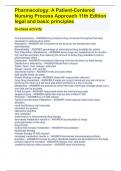
Pharmacology
Pharmacology: A Patient-Centered Nursing Process Approach 11th Edition legal and basic principles In-class activity Pharmacokinetics - ANSWER-the process of drug movement throughout the body necessary to achieve drug action Absorption - ANSWER-the movement of the drug into the bloodstream after administration Bioavailability - ANSWER-percentage of administered drug available for activity First Pass Effect (Metabolism) - ANSWER-some drugs are metabolized to an inactive form and are excreted, ...
- Exam (elaborations)
- • 2 pages •
Pharmacology: A Patient-Centered Nursing Process Approach 11th Edition legal and basic principles In-class activity Pharmacokinetics - ANSWER-the process of drug movement throughout the body necessary to achieve drug action Absorption - ANSWER-the movement of the drug into the bloodstream after administration Bioavailability - ANSWER-percentage of administered drug available for activity First Pass Effect (Metabolism) - ANSWER-some drugs are metabolized to an inactive form and are excreted, ...
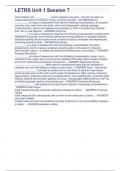
LETRS Unit 1 Session 7
LETRS Unit 1 Session 7 Once children are ___________ - which happens very early - they do not catch up unless intervention is intensive, timely, and well informed. - ANSWER-behind __________ is a type of assessment that has the following characteristics; all students once per year, tests have time limits, silent and independent reading, passage comprehension, scores are reported as percentiles or NCE and states may develop their own or use National. - ANSWER-Outcome __________ is a type of asse...
- Exam (elaborations)
- • 1 pages •
LETRS Unit 1 Session 7 Once children are ___________ - which happens very early - they do not catch up unless intervention is intensive, timely, and well informed. - ANSWER-behind __________ is a type of assessment that has the following characteristics; all students once per year, tests have time limits, silent and independent reading, passage comprehension, scores are reported as percentiles or NCE and states may develop their own or use National. - ANSWER-Outcome __________ is a type of asse...
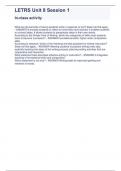
LETRS Unit 8 Session 1 In-class activity
LETRS Unit 8 Session 1 In-class activity What are the benefits of having students write in response to text? Select all that apply. - ANSWER-It prompts students to reflect on what they have learned; It enables students to connect ideas; It allows students to paraphrase ideas in their own words. According to the Simple View of Writing, which two categories of skills must students learn to become successful? - ANSWER-foundational skills; higher order composition skills According to research, whi...
- Exam (elaborations)
- • 1 pages •
LETRS Unit 8 Session 1 In-class activity What are the benefits of having students write in response to text? Select all that apply. - ANSWER-It prompts students to reflect on what they have learned; It enables students to connect ideas; It allows students to paraphrase ideas in their own words. According to the Simple View of Writing, which two categories of skills must students learn to become successful? - ANSWER-foundational skills; higher order composition skills According to research, whi...
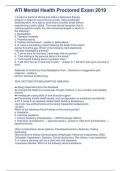
ATI Mental Health Proctored Exam
ATI Mental Health Proctored Exam 2019 1.A client is fearful of driving and enters a behavioral therapy program to help him overcome his anxiety. Using systematic desensitization, he is able to drive down a familiar street without experiencing a panic attack. The nurse should recognize that to continue positive results, the client should participate in which of the following? a. Biofeedback b. Therapist modeling c. Frequent pacing d. Positive reinforcement - answer-a. Biofeedback 2. A nurse is c...
- Exam (elaborations)
- • 19 pages •
ATI Mental Health Proctored Exam 2019 1.A client is fearful of driving and enters a behavioral therapy program to help him overcome his anxiety. Using systematic desensitization, he is able to drive down a familiar street without experiencing a panic attack. The nurse should recognize that to continue positive results, the client should participate in which of the following? a. Biofeedback b. Therapist modeling c. Frequent pacing d. Positive reinforcement - answer-a. Biofeedback 2. A nurse is c...

PN HESI EXIT EXAM 2023/2024 LATEST VERSION QUESTIONS AND ANSWERS BEST GRADED A+ ASSURED SUCCESS FOR NURSING 1)
BEST SELLER